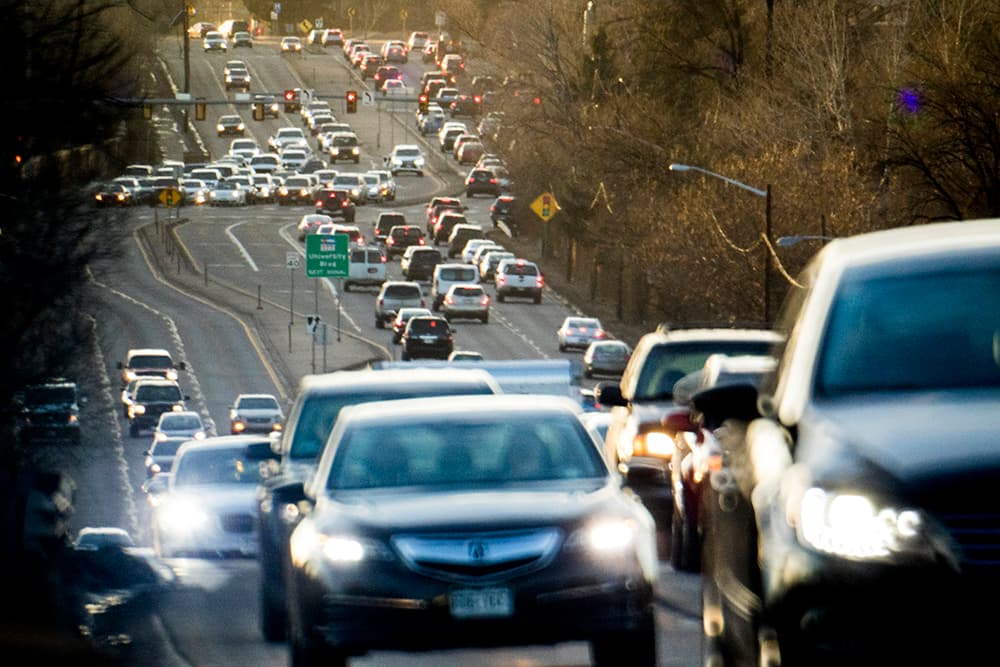Colorado voters rejected two competing transportation measures Tuesday that would've raked in a combined of $9.5 billion over the next 20 years through a sales tax bump and bonding.
Instead, the Colorado Department of Transportation and cities and towns around the state will go without new transportation funding from state coffers.
Proposition 109, known as Fix Our Damn Roads, would have required the state to borrow $3.5 billion solely for road expansion and maintenance -- no transit, walking or biking. Proposition 110, known as Let's Go Colorado, would have raised $6 billion over two decades with a .62-cent sales tax bump. That money would fund roads with some multi-modal transposition options, plus some money earmarked for cities and towns to spend however they please.
With 46 percent of counties reporting Tuesday, "no" votes on Prop 109 were up by 23 points. "No" votes on Prop 110 were winning by 19 points. That was enough for both campaigns to call it a night.
"We want a recount," joked Jon Caldara, head of the Libertarian think tank Independence Institute, who was behind the Fix Our Damn Roads campaign.
In an interview, Caldara admitted to putting the bond issue on the ballot to run interference on Let's Go Colorado.
"It was a way to destroy their tax increase in a new and creative way," he said. "In that, mission accomplished."
The Let's Go Colorado squad put future transportation funding back in the court of politicians and the state legislature.
"Obviously it will be a continuing challenge for the state, the new legislature and new governor to find a solution that’s palatable to the majority of citizens in the state," said Sean Duffy, spokesperson for the Let's Go Colorado campaign.
The statewide loss could make a local or regional transportation more likely in Denver.
Proposition 110 would’ve brought in about $29 million for Denver to spend on anything it wanted, according to the Denver Department of Finance. Plus it would have provided funding for bus rapid transit on East Colfax Avenue and pedestrian fixes to Federal and Colfax avenues.
Denver has different needs than the rest of Colorado, namely infrastructure for walking, biking and transit. For example, the Hancock administration has a new 20-year plan for transit, but no funding source. Passing a citywide or regional ballot measure could be on the table, said Piep van Heuven, Denver director with Bicycle Colorado.
"I think it is easier to pass transportation measures in urban areas,” van Heuven said. “And one of the benefits of Prop 110 was that everyone would’ve benefited, so I think rural Colorado really loses out with Proposition 110 not passing.”
If 110 failed because of 109, some locals can actually thank Caldara. The “pro-transit” measure funded highway and road expansion, too, which didn’t sit right with some voters.
“The prospect of a significant injection of money at the local level for pedestrian, bicycle and transit infrastructure was enticing, but I wasn’t willing to swallow the accompanying highway widening projects which would have consumed the lion’s share of new funding,” said Jonathan Fertig, an advocate for multimodal transit who voted against 110.
Both measures failing triggers a 2019 ballot measure in the legislature.
The Colorado General Assembly passed a transportation bill this year that requires lawmakers to refer a bond measure to voters worth $2.3 billion in 2019, should both 109 and 110 fail. So that’s coming.
In the meantime, the Colorado Department of Transportation claims it has a list of $9 billion worth of unfunded projects. They'll have to do "less with less," said CDOT spokesperson Amy Ford.
"You simply continue to take the peanut butter that you got and continue to spread it across the state, and right now we're spreading that pretty thin."












